Ardgowan Distillery Company Limited appoints industry stalwart as Chairman
Ardgowan Distillery Company Limited appoints industry stalwart as Chairman
Award-winning Independent Whisky
Bankfoot Farm, Inverkip, PA16 0DT
NEWSInverclyde-based Ardgowan Distillery has expanded its team with another industry heavy-hitter, appointing a new Chairman in anticipation of its £20 million ‘cathedral of whisky’ becoming operational at the end of 2024.
With 30 years’ experience founding successful independent distilleries including the Isle of Arran Distillers and The Lakes Distillery, Paul Currie brings an extensive understanding of the whisky industry to state of the art, net-zero designed Ardgowan distillery.
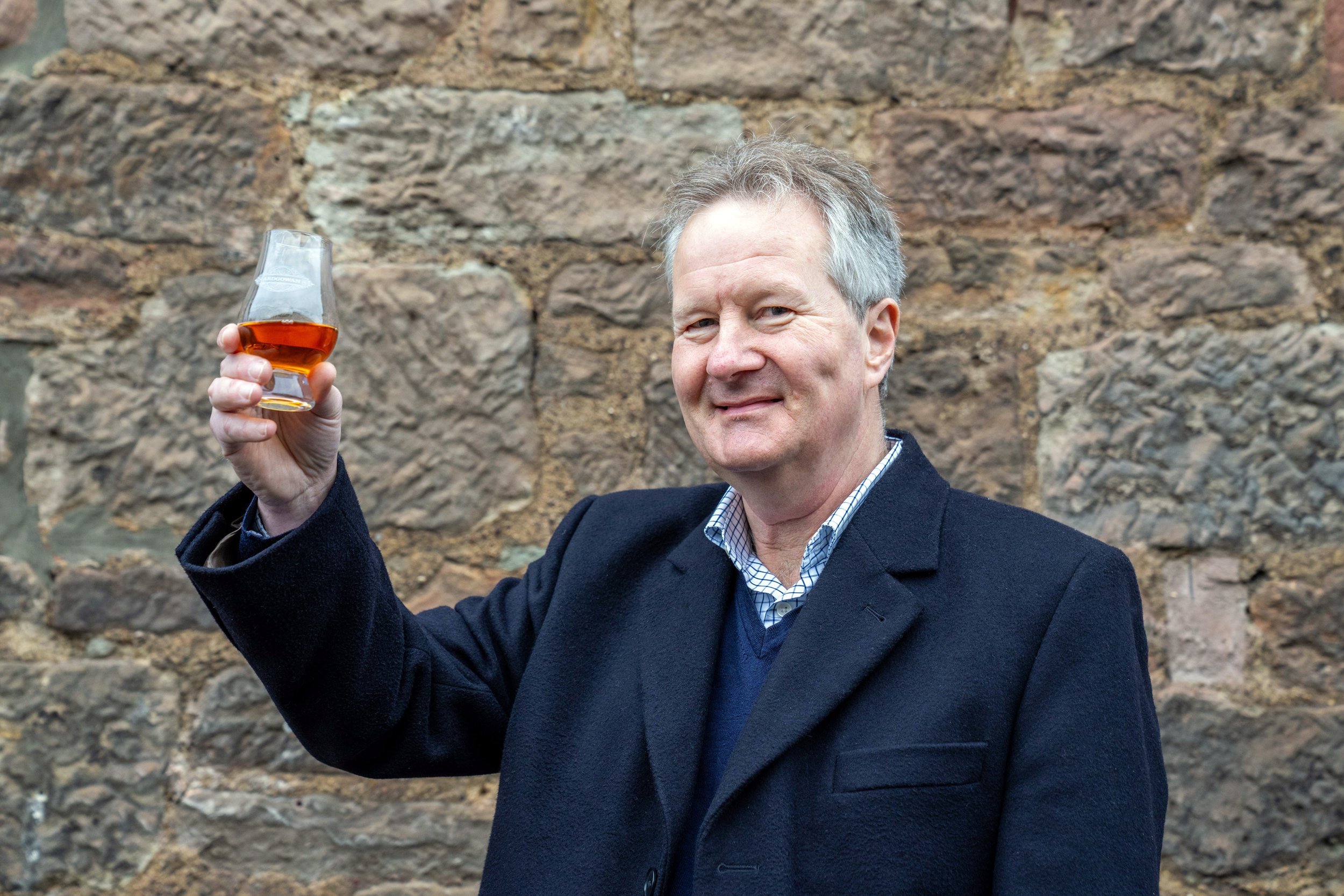
Speaking on his appointment, Paul commented:
“There has been great change in the malt whisky industry over the last 30 years, as many new independent distilleries have opened. I have been fortunate to have been involved as co-founder of two of these, Isle of Arran and The Lakes, both of which continue to grow and prosper.
“A new wave of distilleries are now opening both in Scotland and in the rest of the world and Ardgowan Distillery is set to be at the forefront of these, with a terrific location, innovative ideas and an outstanding team.
“From the cutting-edge technologies helping the distillery reach its sustainability goals to the commitment to quality made through Ardgowan’s investment in its unique Infinity casks, everything to date has been planned to the highest standard.
“With construction now underway on site, it is a pivotal time to be joining the team. I am particularly looking forward to supporting the development of the Clan Ardgowan programme which allows whisky lovers from all over the world to become part of Ardgowan Distillery’s journey. I am also enthusiastic about bringing my knowledge and experience to the team to help Ardgowan to become a leading single malt brand.”
Paul joins a team of notable industry names currently backing the distillery including ex-Macallan Master of Wood, Stuart Macpherson and Master Whisky Maker, Max McFarlane, previous Lead Whisky Maker at Edrington with over 40 years industry experience.
His appointment comes in tandem with the recent appointment of Sales and Marketing Director, David Keir, a Founding Director of The GlenAllachie Distillers Company with over 25 years industry experience.
Ardgowan Distillery Chief Executive, Martin McAdam, added:
“As a start-up distillery it is so important for us to be able to attract great people. With Paul’s experiences from both Isle of Arran and The Lakes Distillery, he is someone who has built distillery businesses from the ground-up it is a real pleasure to bring him on board as our Chairman.
We share a lot in common with Lakes Distillery and what Paul and his team have done at Lakes is similar to the visitor experience that we wish to bring to Ardgowan Distillery.”
Ardgowan Distillery is implementing extensive heat recovery and heat storage as part of the whisky-making process. The distillery has already partnered with Heriot Watt University and engineers Briggs of Burton to develop technology to capture and repurpose the CO2 in its fermentation process.
Ardgowan expects to create almost 50 jobs for the local area and, upon completion, will have the capacity to produce up to one million litres of premium whisky per year.
Ground broken on £20m 'Cathedral of Whisky
Ground broken on £20m 'Cathedral of Whisky
Award-winning Independent Whisky
Bankfoot Farm, Inverkip, PA16 0DT
NEWSWe are delighted to announce that we have broken ground on phase one of our £20 million ‘cathedral of whisky’, Inverclyde’s first zero-carbon whisky distillery.
Inverkeithing based Muir construction will deliver the first build phase which is expected to last 12 months and will see the completion of the distillery’s main production elements, including core groundworks, steelwork, and distillation equipment, enabling us to begin producing its own spirit from 2024.
This first build phase represents the culmination of almost 7 years’ careful planning for the our founders, marking a huge milestone in the ergonomic, energy efficient distillery and visitor experience, which will create up to 47 local jobs and produce up to 1m litres of premium whisky per year.
The innovative distillery design uses low environmental impact composite cladding, timber and steel materials to create a modern Nordic long hall, symbolising resurrection and rising from the ashes of the former Ardgowan Distillery in Greenock, which was bombed during the 1941 Blitz.
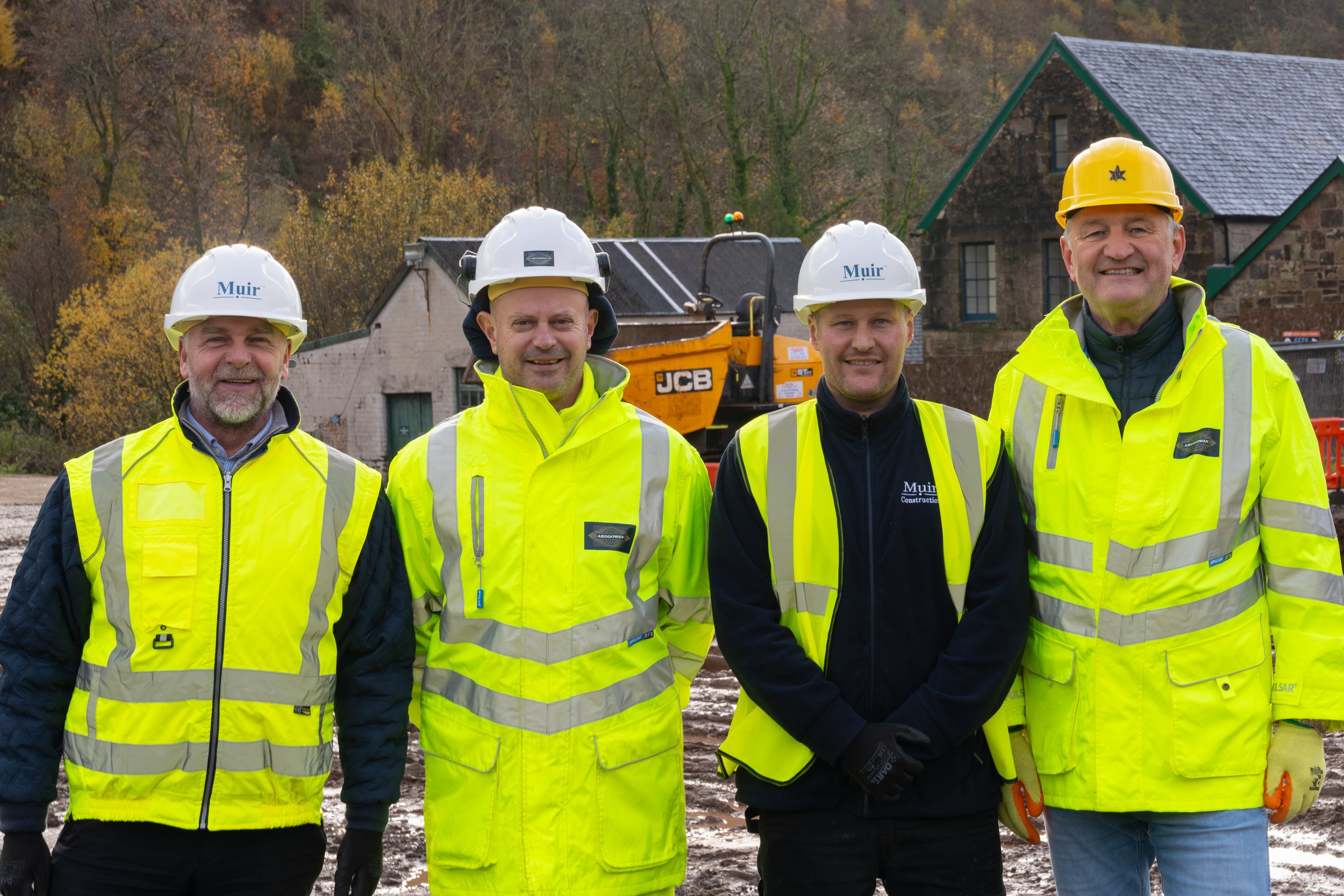
The ambitious plans for the new net-zero distillery include cutting-edge technologies and partnerships with new technology developers to deliver a truly carbon-neutral spirit. The distillery has partnered with Heriot-Watt University and engineers Briggs of Burton to develop technology to capture all of the CO2 in its fermentation process and transform it into green biomethane – a technique which has never been used in a Scotch whisky distillery before.
Martin McAdam, CEO, said:
“It’s been almost seven years in the planning, spanning Brexit, a global pandemic, and five
Prime Ministers. But now, finally, we have started construction
“Muir have been integral in constructing some of the finest Scotch Whisky distilleries open today and are at the forefront of several pioneering Scottish sustainability projects. We welcome their expertise as we embark on the first major phase of our state of the art distillery.”
Muir Construction, part of Muir Group, is established in distillery construction, previously working with a number of major distillery companies, including William Grant & Sons, Distell and Glenmorangie. They have also worked on a number of key sustainability projects, including the Queens Quay Energy Centre in Glasgow and Celtic Renewables.
To date, a total funding package of £24m has been secured for the project, with the distillery recently raising in excess of £3.6m via a convertible loan note from shareholders.
'Building Ardgowan Distillery' - an exclusive series with Whisky Magazine
'Building Ardgowan Distillery' - an exclusive series with Whisky Magazine
Award-winning Independent Whisky
Bankfoot Farm, Inverkip, PA16 0DT
NEWSFollowing the commencement of construction at the Distillery site at Bankfoot, Inverkip, we are thrilled to announce that we will be documenting the process of the build in an exclusive series with Whisky Magazine.
With 30 years’ experience founding successful independent distilleries including the Isle of Arran Distillers and The Lakes Distillery, Paul Currie brings an extensive understanding of the whisky industry to state of the art, net-zero designed Ardgowan distillery.

Chronicling the entire journey from the initial idea to the day spirit finally runs from our stills, this is a unique opportunity to see every step involved in creating our landmark building – the highs and the lows!
Part 1: Laying the foundations, is live now – our CEO Martin McAdam shares the long road already taken to get us to the point of breaking ground.
Main contractor appointed for first phase of £20m Inverclyde distillery
Main contractor appointed for first phase of £20m Inverclyde distillery
Award-winning Independent Whisky
Bankfoot Farm, Inverkip, PA16 0DT
NEWSInverclyde’s first zero-carbon whisky distillery, Ardgowan Distillery, has appointed Inverkeithing based Muir Construction to begin the first phase of its £20 million “cathedral of whisky”
The £7m contract is expected to last 12 months and will see the completion of the distillery’s main production elements, enabling Ardgowan to begin producing its own spirit from 2024.

This first build phase represents the culmination of almost 7 years’ careful planning for the distillery founders, marking a huge milestone in the ergonomic, energy efficient distillery and visitor experience, which will create up to 47 local jobs and produce up to 1m litres of premium whisky per year.
The innovative distillery design uses low environmental impact composite cladding, timber and steel materials to create a modern Nordic long hall, symbolising resurrection and rising from the ashes of the former Ardgowan Distillery in Greenock, which was bombed during the 1941 Blitz.
The ambitious plans for the new net-zero distillery include cutting-edge technologies and partnerships with new technology developers to deliver a truly carbon-neutral spirit. The distillery has partnered with Heriot-Watt University and engineers Briggs of Burton to develop technology to capture all of the CO2 in its fermentation process and transform it into green biomethane – a technique which has never been used in a Scotch whisky distillery before.

Martin McAdam, CEO, said:
“Partnering with Muir Construction for this first phase of the build is a major and very welcome step forward for us. It was imperative that we selected a contractor who shares the same values for sustainability. Muir’s experience constructing some of the finest Scotch Whisky distilleries open today, coupled with their hand in pioneering Scottish sustainability projects meant they were the perfect fit.”
Muir Construction, part of Muir Group, are established in distillery construction, previously working with a number of major distillery companies, including William Grant & Sons, Distell and Glenmorangie. They have also worked on a number of key sustainability projects, including the Queens Quay Energy Centre in Glasgow and Celtic Renewables.
Alan Muir joint managing director at Muir Construction, said:
“We are delighted to be given the opportunity by Ardgowan Distillery to join the delivery team in what is an exceptional distillery. Not only will this be at the forefront of distilling fine whisky, but it will also be an outstanding statement in visual design, something I’m sure we will all be proud of on completion.
“Our construction team is very excited to get started on the first step in what we are sure will be an excellent ongoing relationship.”
Ardgowan’s multi award winning selection of sherry cask influenced malts recently celebrated a triple gold win at the 2022 Scotch Whisky Awards, their Clydebuilt whisky range is available from specialist retailers across the UK.
To date, a total funding package of £24m has been secured for the project so far, with the distillery recently raising in excess of £3.6m via a convertible loan note to shareholders.
Water with your whisky?
Water with your whisky?
Award-winning Independent Whisky
Bankfoot Farm, Inverkip, PA16 0DT
NEWSA point of endless contention, a discussion topic that has filled many evenings with (mostly) friendly debate, and a question we are asked daily: does adding water to your whisky dilute the flavour, or ‘open up’ the contents for a fuller experience? Dr Kate McAdam gives us a look at the science to help…

The main components of any whisky are ethanol and water, usually found in a ratio of around 40:60, but it is actually the minor components that give the spirit its unique characteristics. Despite composing <1% of the total volume, these minor components are responsible for both aroma and flavour.
All molecules can be classed as water-loving (hydrophilic), water-hating (hydrophobic) or a bit of both (amphiphilic).
Ethanol is made up of two carbons (-CH2-CH3) attached to an oxygen (-OH) and so is one of these ‘all-rounders’.
The -OH (hydroxyl) part loves water, but the two carbons would prefer to keep as much distance between themselves and water as possible
To achieve this at low concentrations, the ethanol molecules will line up at the surface of water within a glass, with the –OH pointing towards the water, and the carbon chain sticking up into the air.
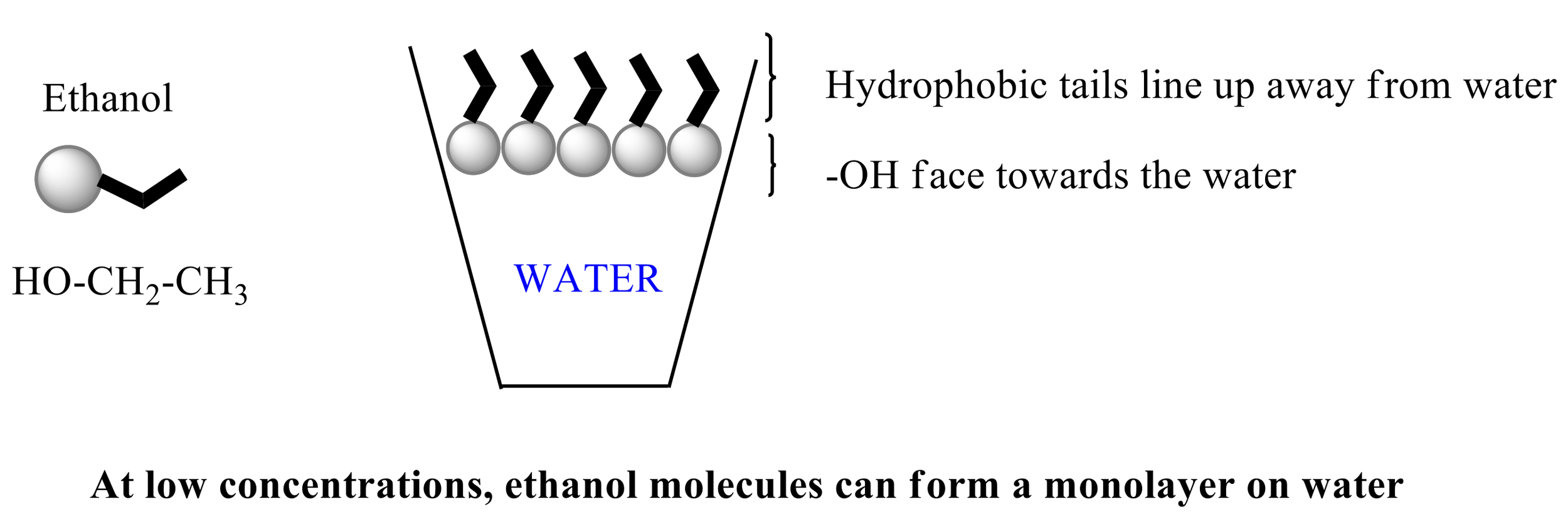
At higher concentrations, things get even more interesting! Once there are too many ethanol molecules to fit in a monolayer, the ethanol starts to fall out into the main body of water and can form tight balls (or micelles) to that force the water to the outside and keep the hydrophobic chains on the inside. When this happens, some of the lovely, tasty aromatic components rush to be inside and away from the water too. (Fun fact: this is exactly how washing up liquid helps cleaning up greasy dishes!)
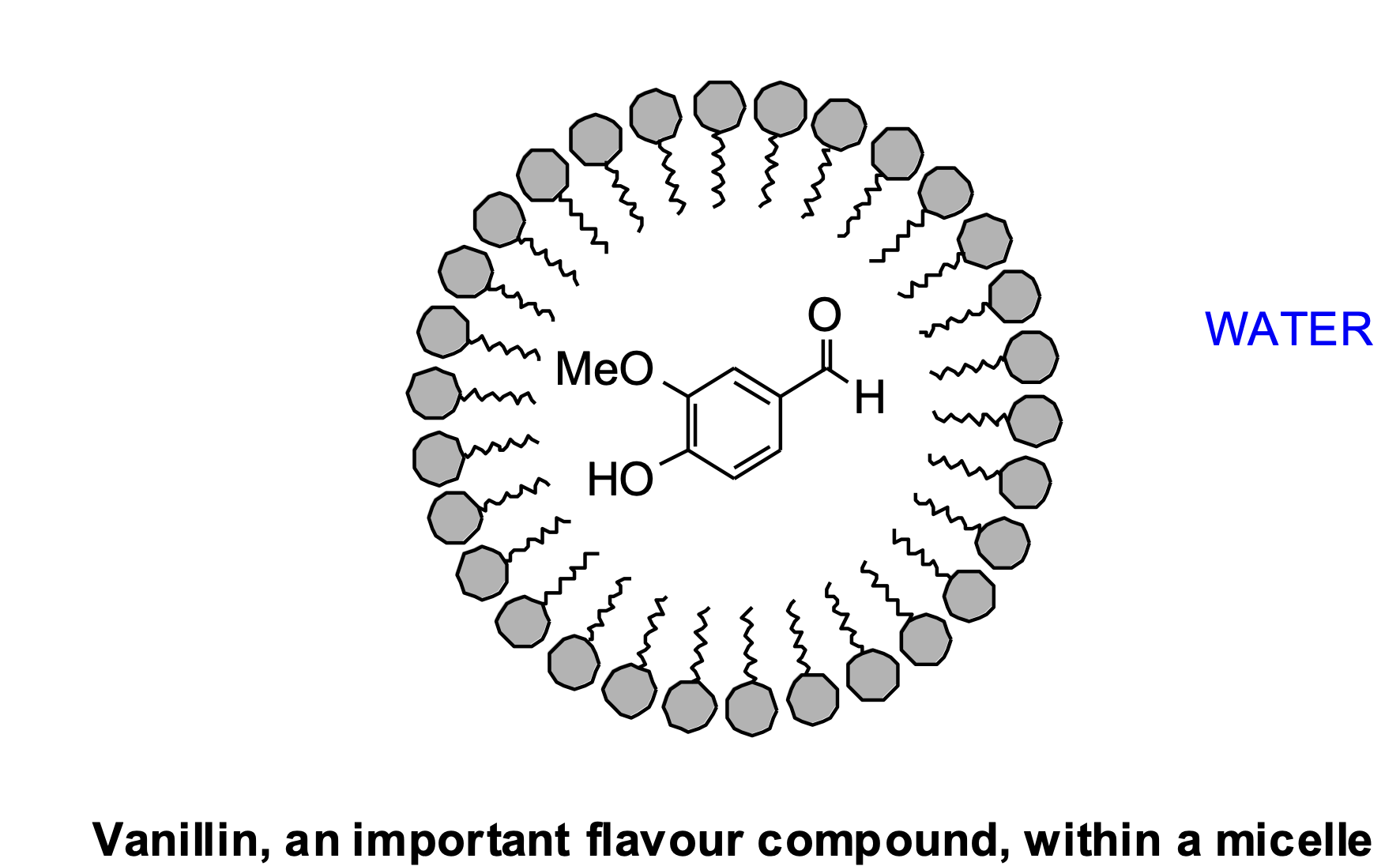
Once inside the micelle, a molecule can’t evaporate to reach your nose so the bouquet is hidden and, on tasting, can be rolled right past your taste receptors.
But what about adding water? As you add water, the opposite happens, with the number of micelles dropping and the flavour compounds being forced out into the water. At that point, the only way out is up – with nowhere to hide, all components are presented for your enjoyment of a full burst of smell and flavour (you can check out our blog on chill filtration for more information on how related processes can affect flavour).
Recent computational studies have even suggested that it is the monolayer itself that alters flavour as it coats your tongue, but the authors do note that this was never put to the taste test!
So after all this, what is the answer? Well, here at Ardgowan we have concluded (after extensive testing) that the ‘correct’ way to take your favourite dram is…simply that which brings you the most enjoyment.
Slàinte Mhath,
Dr. Kate McAdam, PhD
B.A. (Mod) MedChem
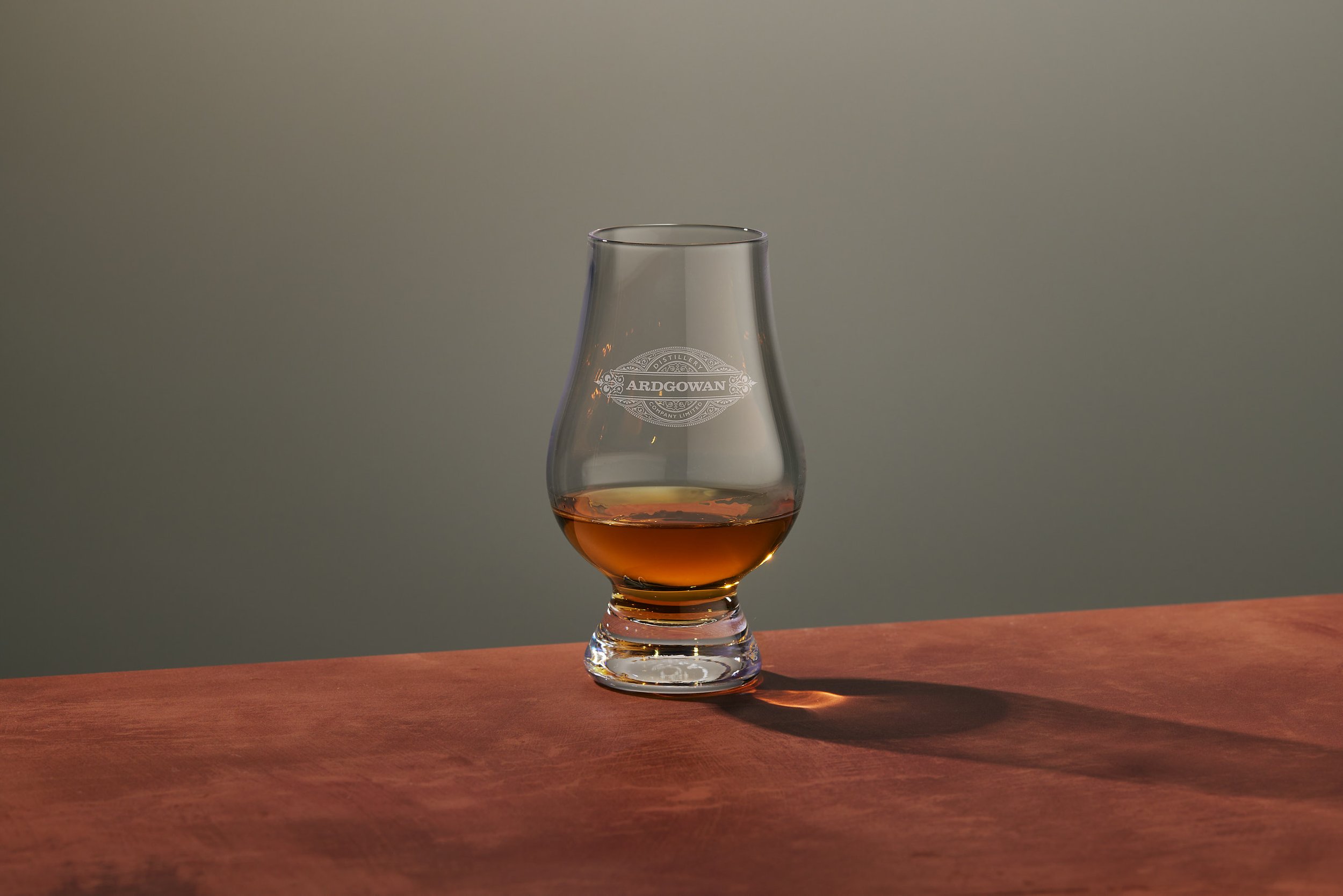
The whisky regions of Scotland
The whisky regions of Scotland
Award-winning Independent Whisky
Bankfoot Farm, Inverkip, PA16 0DT
NEWSIf you’ve joined us at a tasting or popped by our stand at a whisky show, you may have heard us talk about the regions the various whiskies in our award-winning blended malts come from - but what does this actually mean for your dram? Our CEO Martin McAdam explains a wee bit more:
There are five main whisky-producing regions in Scotland. Each region has its own unique terroir, water sources, and production methods that contribute to the distinctive flavours and characteristics of its whiskies:
Campbeltown: A small town on the Kintyre peninsula in western Scotland, Campbeltown produces whiskies that are often described as having a salty, briny, and oily character.
Highland: The largest whisky-producing region in Scotland, covering a vast area with a wide range of styles from light and fruity to rich and full-bodied.
Islay: An island off the west coast of Scotland, Islay produces powerful, peaty whiskies with strong smoky and medicinal notes.
Lowland: The southernmost region, known for its lighter, gentler style of whisky, often with floral and grassy notes.
Speyside: Located in the northeast of Scotland, Speyside is known for its sweet and rich whiskies, often with notes of honey, nuts, and dried fruit.
The Scottish whisky regions are important to whisky enthusiasts, as they provide a way to categorise and compare different styles of Scotch whisky. Each region has its own unique history, production techniques, and flavour profiles, and these can be useful for understanding and appreciating the complexity and diversity of Scotch whisky.
The classification of Highlands and Lowlands as regions was as a result of legislation – the “1784 Wash Act”. The Act aimed to reduce illicit distilling and stimulate legal distilling in the Highlands. Accordingly lower rates of duty were applied to small scale distilleries north of the Lowland/ Highlands dividing line. Highland distilleries paid taxes based on the size of their still, meanwhile Lowlands distilleries were taxed per gallon in the wash. As a result, Lowlands distilleries paid much higher high duty rates than their colleagues in the Highlands.
However, it’s important to note that these regions are not a set of rigid rules that all Scotch whiskies must follow. While whisky production in Scotland is highly regulated, there is still a lot of room for experimentation and innovation within each region. Some whisky makers may choose to blend whiskies from different regions, or to create new styles that don’t fit neatly into any one category. Many distilleries outside of Islay now produce peated whiskies – indeed any particular whisky profile can probably be produced from any region – but getting a coastal / maritime terroir may be a challenge if the distillery and maturation warehouse is located inland many miles from the sea.
Ultimately, the most important thing when it comes to Scotch whisky is the flavour and experience that it provides to the individual drinker. Whether you prefer a peaty Islay whisky or a fruity Speyside dram, what matters most is finding a whisky that you enjoy and that speaks to your own taste and preferences.
The regional classifications can also help consumers to better understand and appreciate the diversity of Scotch whisky. By understanding the different flavour profiles associated with each region, drinkers can make more informed choices about which whiskies they might enjoy.
In summary, the regional classifications are not a set of hard-and-fast rules, and there is still plenty of room for experimentation and variation within each region. However, the classifications can be a useful starting point for understanding the characteristics of different whiskies and appreciating the rich history and traditions of Scotch whisky production.
Slàinte mhath
Martin
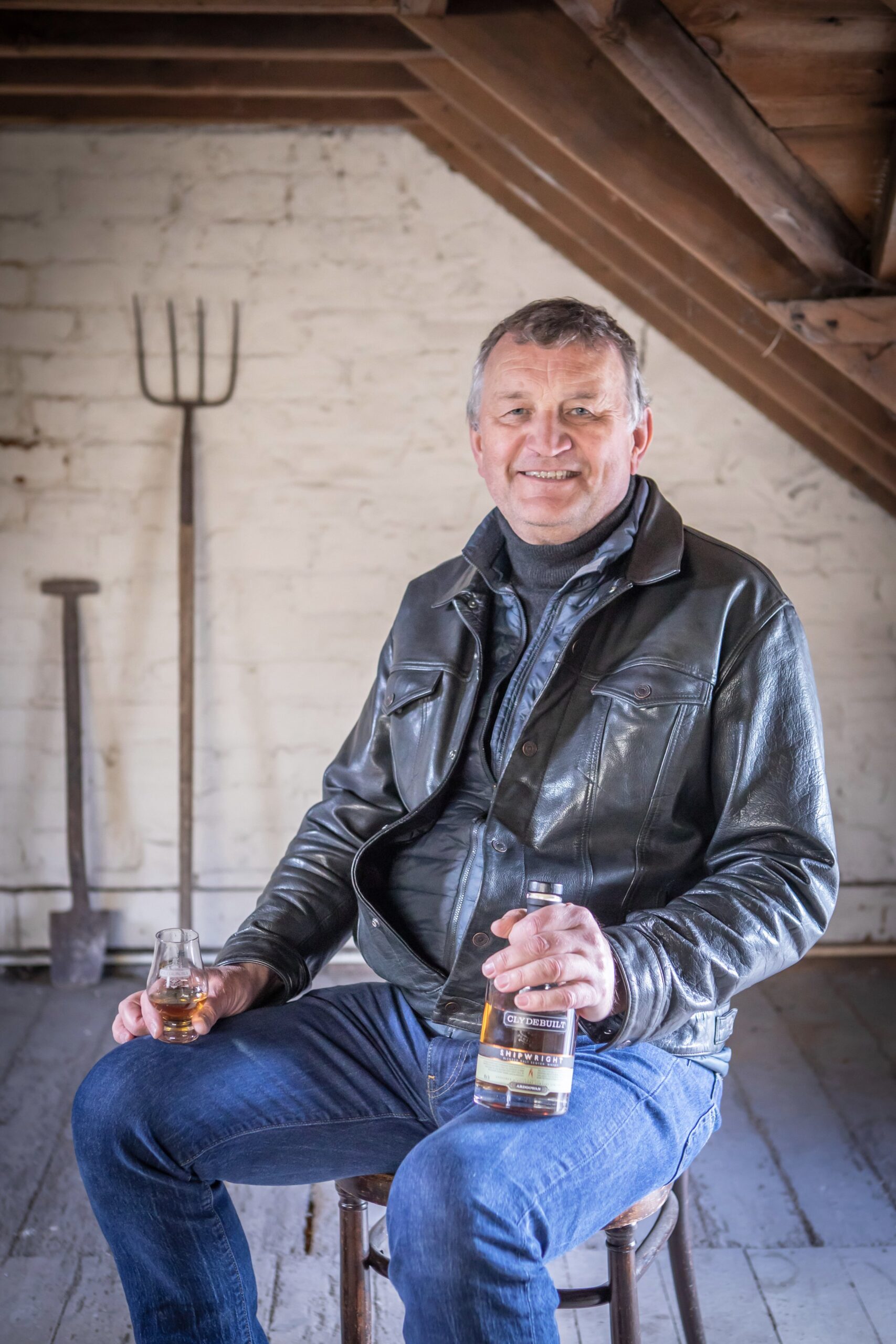
What is Scotch Whisky?
What is Scotch Whisky?
Award-winning Independent Whisky
Bankfoot Farm, Inverkip, PA16 0DT
NEWSWith all the information out there, whisky can seem a complex and confusing drink. What does ‘Scotch Whisky’ even mean? Our CEO Martin McAdam is here to help…
Well, as you might imagine, any whisky called Scotch must be produced in Scotland. But more than that, as a registered ‘Geographical Indication’ (like Champagne) Scotch Whisky must be produced according to strict regulations set down in law.
To understand this better, our starting point the Scotch Whisky Regulations (SWR) 2009. Here in law is the exact definition of what Scotch Whisky is. According to the SWR, whisky can only be called Scotch if it has been produced at a distillery in Scotland from water and malted barley (to which only whole grains of other cereals may be added). Furthermore, Scotch Whisky can only be so defined if:
• The malt and grains are processed at that distillery into a mash
• The mash is fermented at that distillery only by adding yeast
• It’s distilled at an alcoholic strength by volume of less than 94.8%
• The resultant spirit is wholly matured in Scotland in oak casks of a capacity not exceeding 700 litres, for at least three years
• The whisky retains the colour, aroma, and taste of the raw materials used in, and the method of, its production and maturation.
• It contains no added substances, other than water and plain caramel colouring.
• It has a minimum alcoholic strength by volume of 40%.
According to the regulations there are only two basic types of Scotch whisky, from which all Scotch is made:
• Single Malt Scotch Whisky – a Scotch Whisky produced from only water and malted barley at a single distillery by batch distillation in pot stills
• Single Grain Scotch Whisky – a Scotch Whisky distilled at a single distillery but, in addition to water and malted barley, may involve whole grains of other malted or un-malted cereals.
There is a little wrinkle in the above definitions for a distillery producing both single malt and single grain. Excluded from the definition of “Single Grain Scotch Whisky” is any spirit that qualifies as a Single Malt Scotch Whisky or a Blended Scotch Whisky. The latter exclusion is to ensure that a Blended Scotch Whisky produced from single malt(s) and single grain(s) distilled at the same distillery does not also qualify as a Single Grain Scotch Whisky.
At the last count Single Malt Scotch Whisky accounted for about 12% of total Scotch Whisky production. Using the two productions methods we can arrive at a total of 5 different Scotch Whisky types:
Single Malt Scotch Whisky
Single Grain Scotch Whisky
Blended Malt Scotch Whisky
Blended Grain Scotch Whisky
Blended Scotch Whisky
It is worth expanding a wee bit more on blends:
Blended Malt Scotch Whisky means a blend of two or more Single Malt Scotch Whiskies from different distilleries.
Blended Grain Scotch Whisky means a blend of two or more Single Grain Scotch Whiskies from different distilleries.
Blended Scotch Whisky means a blend of one or more Single Malt Scotch Whiskies with one or more Single Grain Scotch Whiskies.
Creating blends is something that requires great skill. A master whisky maker like Max McFarlane loves the challenge. He loves Single Malt Scotch Whisky, but not every single malt is created equal. Using his skills, he can take a number of average single malts and create a splendid blended malt with the best characteristics of all its parts.
There is much disagreement about what is the best whisky. It will come down to personal taste. Some people choose to only drink a single malt, others will only drink a blended whisky.
Given the number of distilleries and whisky types – there is a lot of choice out there!
Slàinte mhath,
Martin
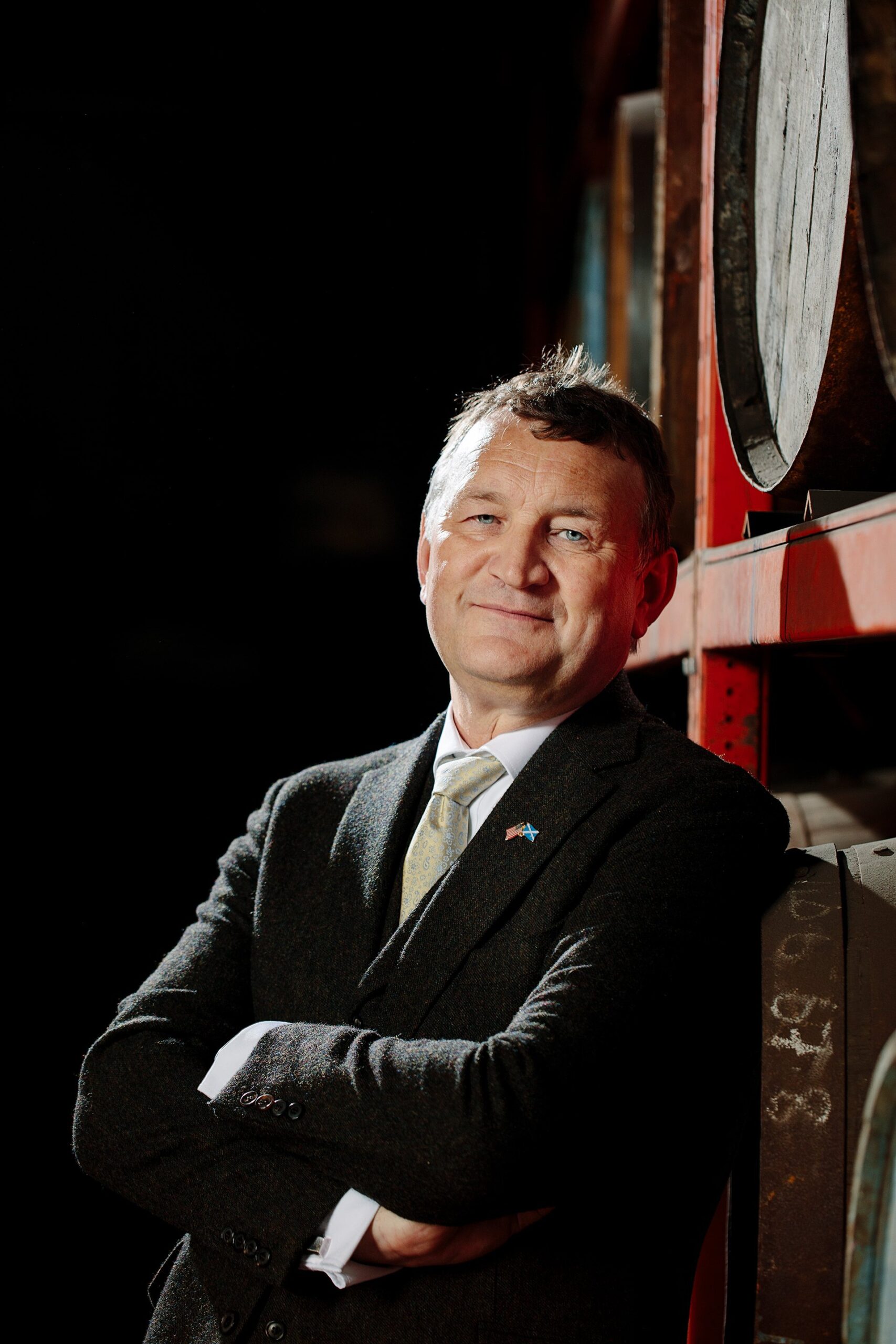
Ardgowan Distillery unveils first unique cask design in a century with £100m deal
Ardgowan Distillery unveils first unique cask design in a century with £100m deal
Award-winning Independent Whisky
Bankfoot Farm, Inverkip, PA16 0DT
NEWSWe are delighted to announce that Ardgowan Distillery has signed a £100 million deal with one of Spain’s oldest sherry cask producers to secure a decades long supply of our unique ‘Infinity Casks’ - marking what is believed to be the first unique cask design for the Scottish Whisky industry in more than 100 years.
The Distillery has commissioned Bodegas Miguel Martín to construct the sustainably sourced European oak casks, at a cost of between 30 and 40 times more than standard whisky casks.
As construction of our £20m distillery building project begins, Ardgowan has also appointed our new Master of Wood, Stuart MacPherson, who joins us from Edrington and brings 43 years of experience at some of the world’s most successful spirits companies, including more than a decade as Master of Wood at The Macallan.
Martin McAdam, CEO of Ardgowan Distillery, said:
“With up to 80% of whisky aromas and flavours deriving from casks, it’s imperative to have a Master of Wood as experienced as Stuart to perfect our maturation process. The cask supply contract is an enormous commitment from Ardgowan and demonstrates our dedication to quality and our desire to create a fantastic whisky.
“The Ardgowan Infinity Cask is specifically designed for us and is the first unique cask design for the Scottish Whisky industry in over a century. The casks are specifically designed for long-maturation and will be seasoned with organic sherry for 27 months – far longer than the industry standard of 12-18 months.
“While others hurry to take their whisky to market Ardgowan has made a conscious decision to delay the introduction of our single malt to market to make sure we’re getting the most out of these special casks.”
Roland Grain, principal shareholder at Ardgowan and Director of Investments commented:
“Our partnership with Bodegas Miguel Martín is indicative of our commitment to creating what we hope to be the finest whisky in the world. The first batch of Ardgowan Infinity Casks have already been manufactured and are now seasoning for at least two years in Bodegas’ dunnage warehouse in Sanlúcar de Barrameda.
“While many distilleries tend to just finish their spirits in sherry casks, our whisky will be matured for its whole life in these first-fill Infinity Casks. We have already spent more money on our casks than many others are investing into building a distillery.”
We have already revealed plans for our £20 million distillery, our ‘cathedral of whisky’, with first production scheduled for 2024. A total funding package of £24m has been secured for the project so far, with the distillery recently raising in excess of £3.6m via a convertible loan note to shareholders.
Roland added:
“We’re fortunate to have received excellent financial support from investors so far as we commit to delivering to a true low carbon distillery, and shortly we will be announcing our Clan Ardgowan programme enabling whisky lovers around the world to join our crusade.”
In addition to creating 47 local jobs for Inverclyde, we have invested in leading technologies to put sustainability at the heart of our plans, partnering with Heriot-Watt University and engineers Briggs of Burton to develop pioneering technology to capture all of the CO2 in its fermentation process and transform it into green biomethane. The technique has never been used in a Scotch whisky distillery before.
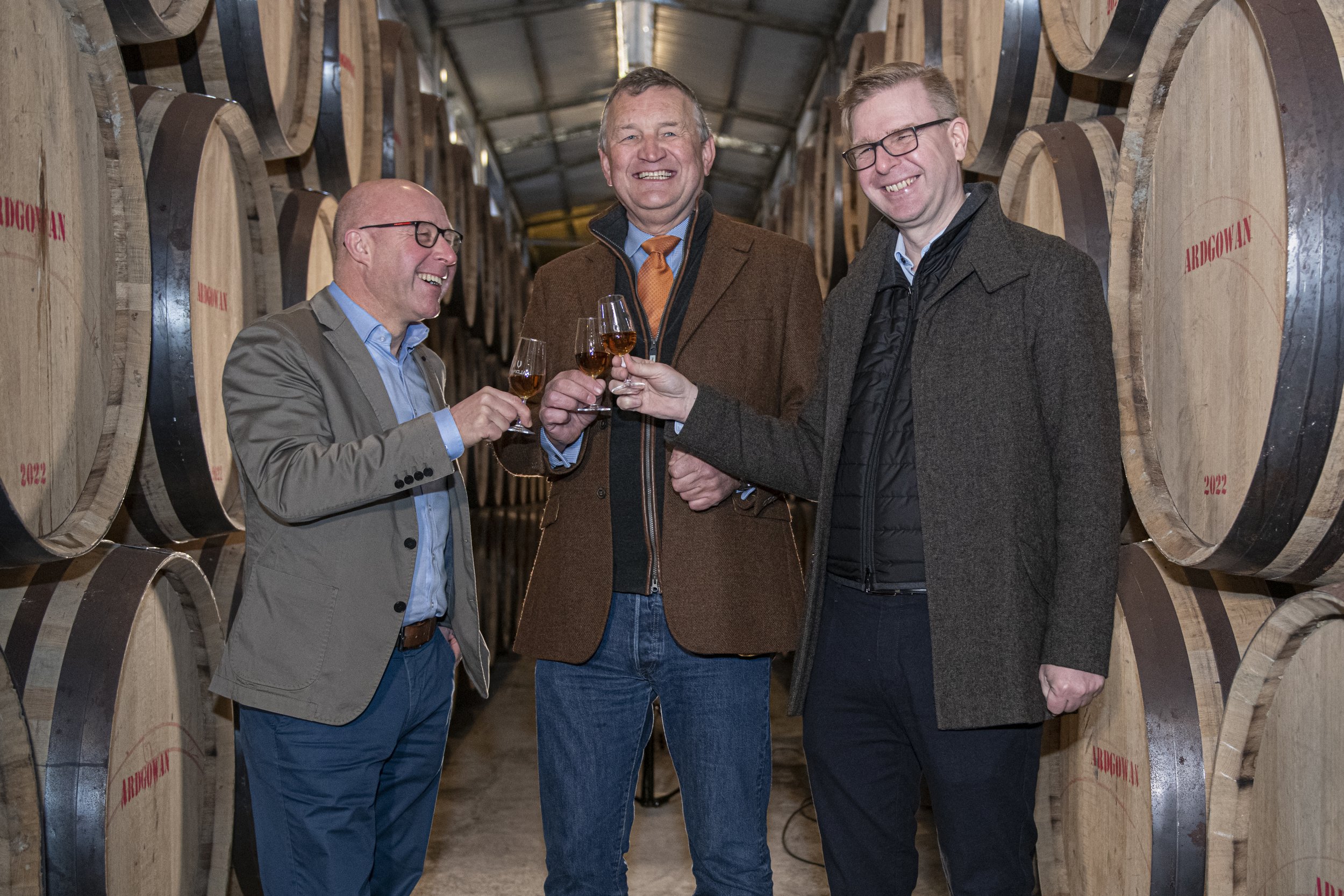
Clydebuilt Sailmaker wins at the World Whiskies Awards in Scotland
Clydebuilt Sailmaker wins at the World Whiskies Awards in Scotland
Award-winning Independent Whisky
Bankfoot Farm, Inverkip, PA16 0DT
NEWSClydebuilt Sailmaker, from Ardgowan Distillery, has just won another award at the World Whiskies Awards 2023. Sailmaker scooped the prize in the first round for Scotland under the category “Blended Malt - No Age Statement”.
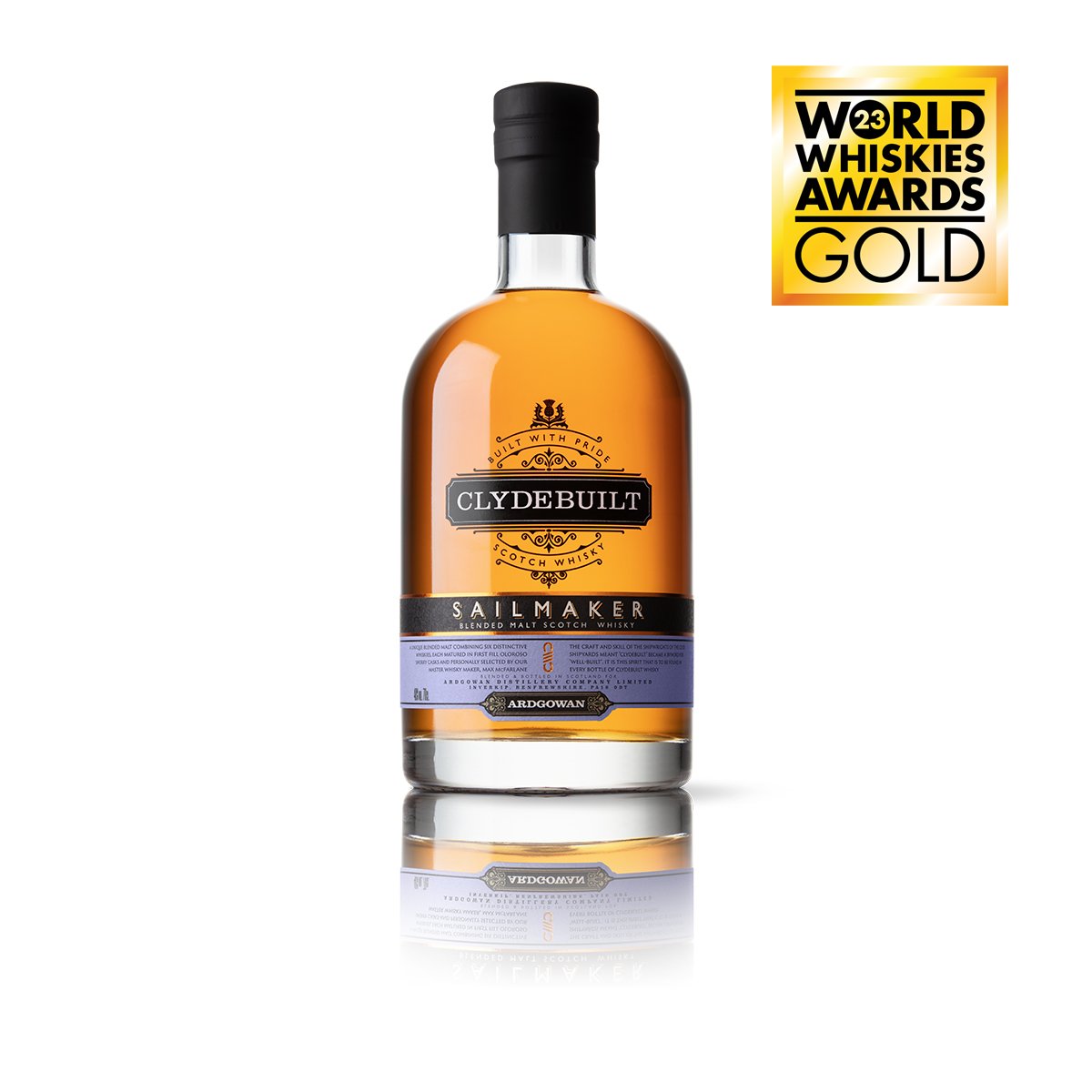
Ardgowan’s success comes just one week after the distillery was awarded some of the highest marks from the independent taste panel at the Scottish Whisky Awards, with a total of three Gold Medals – Clydebuilt Sailmaker, Discovery No.4 and Inverdarach Potstill Editions Aon.
Reflecting on the win, Martin McAdam, CEO at Ardgowan Distillery, said:
“We’re delighted to have won Best Blended Malt at the Whisky Magazine World Whisky Awards. We’re pleased Sailmaker has been so well received, and a big thanks to our team who made it all possible. It was also such an honour to win three Gold Medals at the Scottish Whisky Awards. Our team’s dedication, passion and commitment make us proud every day, and we couldn’t be more pleased to see this recognised.”
The World Whiskies Awards, which took place at The Balmoral Hotel in Edinburgh on December 8th, commends the best whiskies in sixteen categories, covering style and production methods, and aims to recognise the best Scotch whiskies by celebrating the people working to deliver Scotland’s national drink. The competition is judged by a panel of industry experts, bringing together market knowledge and industry experience to identify excellence and innovation in Scottish whisky distilling.
Ardgowan will compete in round two for the title of World’s Best in the World Whisky Awards and will begin production at its eco-friendly single malt whisky distillery, gin distillery and visitor centre in 2024.
Clydebuilt Sailmaker is a unique blended malt combining six distinctive whiskies from Highland, Lowland and Speyside Distilleries. Each of these whiskies has matured in first-fill Oloroso Sherry casks, personally selected by Max McFarlane, Master Whisky Maker at Ardgowan Distillery.
NOSE: Peppery, with an intriguing balance of dried spices, stone fruits, fresh nectarines, chocolate truffles, and Seville orange marmalade.
PALATE: Relaxes slowly to reveal long-lasting butterscotch, marzipan, mangoes, and a hint of vanilla essence.
FINISH: Rich sherry pervades – raisins and spice.
Clydebuilt Sailmaker has been bottled at 48% ABV, without colouring or chill-filtering. It retails at £52.50 via the distillery’s online shop.

Ardgowan takes 3 gold medals in the 2022 Scottish Whisky Awards
Ardgowan takes 3 gold medals in the 2022 Scottish Whisky Awards
Award-winning Independent Whisky
Bankfoot Farm, Inverkip, PA16 0DT
NEWSAt the 4th annual Scottish Whisky Awards, up against nearly 200 Scotch whiskies which were blind-tasted and involving whiskies from 61 Scottish distilleries and independent bottlers, Ardgowan won 3 Gold Awards – in the ‘Single Malt Under 12 Years Old’, ‘Single Cask 12 Years Old and Under’ and ‘Blended Malt’ categories. The winning drams were selected and blended by the Ardgowan team led by our master whisky maker, Max McFarlane. We are beyond excited to win 3 gold medals. Proof that dedication, passion and commitment to excellence paid off.
The first winner of the evening was Clydebuilt Sailmaker, winning Gold in the ‘Blended Malt’ category. Sailmaker follows and surpasses the successful footsteps of the other two Clydebuilt releases, Coppersmith and Shipwright, which previously won Silver in the same category. Sailmaker is a unique blended malt combining six distinctive whiskies from Highland, Lowland and Speyside Distilleries. Each of these whiskies has matured in first-fill Oloroso Sherry casks, personally selected by Max McFarlane.
When we released Sailmaker, Max McFarlane said: “I think Sailmaker is The Clydebuilt Collection’s best whisky yet. It’s the first time we have incorporated Lowland whisky alongside Speyside and Highland single malts, which adds significant depth and richness to the flavour profile.” Tonight’s Gold award proves he was 100% right!
NOSE: Peppery, with an intriguing balance of dried spices, stone fruits, fresh nectarines, chocolate truffles, and Seville orange marmalade.
PALATE: Relaxes slowly to reveal long-lasting butterscotch, marzipan, mangoes, and a hint of vanilla essence.
FINISH: Rich sherry pervades – raisins and spice.
Clydebuilt Sailmaker has been bottled at 48% ABV, without colouring or chill-filtering. It retails at £52.50 via the distillery’s online shop.

The second winner was Discovery No.4, in the ‘Single Malt Under 12 Years Old’ category. This Highland single malt Scotch whisky has been maturing in first-fill sherry hogsheads for 8 years, waiting to be revealed and, most importantly, enjoyed. It has received great feedback from customers in our recent festivals and tastings, becoming a favourite from the start.
NOSE: A light sherried warmth, cinnamon sticks, sugar almonds, barbecued pineapples and delicate florals.
PALATE: Rich, waxy, sweet, butterscotch to the fore, sherry trifle, plump sultanas and treacle tart.
FINISH: A long, lingering finish on the tastebuds.
Discovery No. 4 has been bottled at 60% ABV, without colouring or chill-filtering. It retails at £69.99 via the distillery’s online shop.

The third winner was Inverdarach Potstill Editions Aon, winning Gold in the ‘Single Cask 12 Years Old and Under’ category. Inverdarach Potstill Editions Aon is an 11-year-old Glentauchers (2010) matured in a sherry cask. A true gift for sherry bomb lovers.
NOSE: A rich nose of dark orange marmalade, Christmas cake, and candied pecans alongside a floral edge of spicy, aromatic tulips.
PALATE: Dried fruits, bramble jam, butterscotch fingers and clingy honey notes.
FINISH: Lingers beautifully and showcases the sherry wood in spectacular style.
Inverdarach Potstill Editions Aon has been bottled at 54.2% ABV, without colouring or chill-filtering. It retails at £124.99 via the distillery’s online shop.


